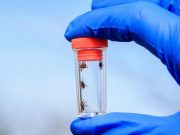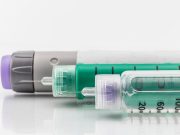Tag: Allergies: Food
Peanut Oral Immunotherapy Efficacious in Allergic Adults
Median tolerated dose increased from 30 mg to 3,000 mg of peanut protein at the exit challenge, equivalent to 12 peanuts
Antibiotic Exposure Before Age 2 May Increase Risk for Chronic Pediatric Conditions
Risk seen for asthma, food allergies, allergic rhinitis, and intellectual disability
Rare Red Meat Allergy Linked to More Tick Species
AAAAI: Omalizumab Superior to Oral Immunotherapy in Multifood Allergy
Most patients include dietary consumption of allergy-triggering foods after gaining tolerance
Peanut Oral Immunotherapy Yields Higher Rates of Tolerance in High-Threshold Allergy
Significantly higher rates seen for desensitization, with durable response for home-measured peanut butter ingestion versus avoidance
Most Families Exclude Food Allergens From Their Household
Those who exclude food allergens report more food allergy-related psychosocial concerns
Early Exposure to Nitrogen Dioxide, PM2.5 Linked to Peanut Allergy
Early-life exposure to nitrogen dioxide, fine particulate matter linked to prevalence and persistence of peanut allergy
ACAAI: 2013 to 2023 Saw Rise in Pediatric Psych Referrals Tied to Food Allergies
During the study period, there was an 11-fold increase in food allergy-related referrals
Food Allergy-Related Distress Is Common
Anxiety about having an allergic reaction was the most commonly reported issue
Allergy-Related Psychological Distress Common
Findings seen among adults and children with food allergies, as well as caregivers of children with food allergies














